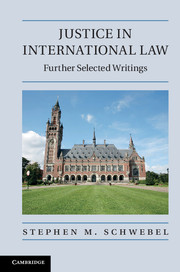Book contents
- Frontmatter
- Contents
- PART I International Court of Justice
- PART II International arbitration
- PART III Miscellaneous
- 27 May preparatory work be used to correct rather than confirm the “clear” meaning of a treaty provision?
- 28 Clean hands, principle
- 29 Compound interest in international law
- 30 The prescience and pertinence of the ILO
- 31 Is mediation of foreign investment disputes plausible?
- 32 Hersch Lauterpacht: fragments for a portrait
- 33 International Law: Being the Collected Papers of Hersch Lauterpacht
- Collected publications, judicial opinions and book reviews
- Index
- References
27 - May preparatory work be used to correct rather than confirm the “clear” meaning of a treaty provision?
from PART III - Miscellaneous
Published online by Cambridge University Press: 07 September 2011
- Frontmatter
- Contents
- PART I International Court of Justice
- PART II International arbitration
- PART III Miscellaneous
- 27 May preparatory work be used to correct rather than confirm the “clear” meaning of a treaty provision?
- 28 Clean hands, principle
- 29 Compound interest in international law
- 30 The prescience and pertinence of the ILO
- 31 Is mediation of foreign investment disputes plausible?
- 32 Hersch Lauterpacht: fragments for a portrait
- 33 International Law: Being the Collected Papers of Hersch Lauterpacht
- Collected publications, judicial opinions and book reviews
- Index
- References
Summary
The Vienna Convention on the Law of Treaties, which entered into force in 1980, has been adopted at this writing by some eighty States, i.e. under half of the membership of the United Nations; and the States not party include a variety of States large and small, including such major States as the United States of America, China, Brazil, India and Pakistan. It nevertheless has been treated more than once by the International Court of Justice as expressive of customary international law binding upon States parties and non-parties alike. Thus in the case concerning the Territorial Dispute (Libyan Arab Jamahariya/Chad), the Court held:
in accordance with customary international law, reflected in Article 31 of the 1969 Vienna Convention on the Law of Treaties, a treaty must be interpreted in good faith in accordance with the ordinary meaning to be given to its terms in their context and in the light of its object and purpose. Interpretation must be based above all upon the text of the treaty. As a supplementary measure recourse may be had to means of interpretation such as the preparatory work of the treaty and the circumstances of its conclusion.
In the case concerning Maritime Delimitation and Territorial Questions between Qatar and Bahrain: Jurisdiction and Admissibility, the Court applied (or, it may be argued, misapplied) the Vienna Convention's provisions on the interpretation of treaties to determine the rights of the parties to the dispute though neither Bahrain nor Qatar was party to the Convention.
- Type
- Chapter
- Information
- Justice in International LawFurther Selected Writings, pp. 289 - 296Publisher: Cambridge University PressPrint publication year: 2011



